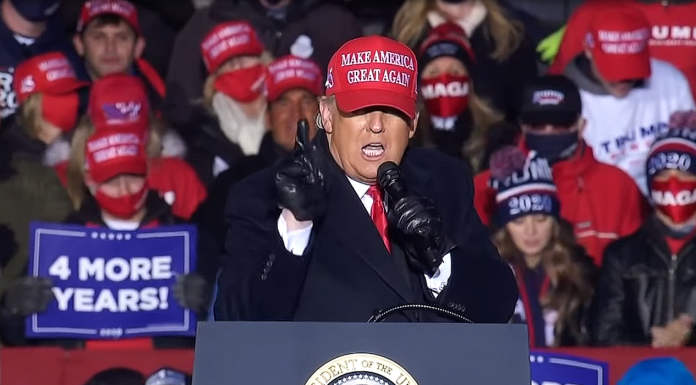President Donald Trump personally sued Wisconsin officials, including Democrat Gov. Tony Evers, accusing them of ignoring state law while administering the Nov. 3 election and allowing ballots to be tampered with during tabulation.
The lawsuit also names several mayors in cities such as Milwaukee, Madison and Kenosha, as well as Wisconsin Secretary of State Douglas LaFollette.
“The United States Constitution prevents the rules in a Presidential Election from being changed at the last minute by un-elected bureaucrats and local politicians who may have a more narrow interest in the outcome of the election,” said Bill Bock, the Trump campaign’s lead counsel in the lawsuit, in a statement released Wednesday.
“… Nothing is more important to our national fabric and future than integrity in our electoral process,” Bock continued. “This lawsuit is one-step in the direction of fairer, more transparent, more professional and ultimately more reliable elections in America.”
Wisconsin was one of several states where a mysterious bump in the wee hours of election night reversed a solid Trump advantage with no explanation.
While some experts have argued that the algorithms in voting-machine software may have been programmed to convert Trump votes to Biden, the current lawsuit focuses more on the mail-in ballot fraud that the campaign alleges transpired.
“Today’s federal lawsuit in Wisconsin reveals an apparently coordinated effort to push a new form of balloting upon Wisconsin voters that was not protected by uniform chain of custody and security standards and protocols,” said Trump Senior Legal Adviser Jenna Ellis.
“Regrettably, this is the same sort of conduct we have seen across many battleground states that Democrats knew they had to win to defeat the President where the rules of the election were changed at the last minute and guardrails against fraud were simultaneously lowered,” she added.
With its window of opportunity to establish widespread and systemic vote fraud narrowing, the campaign appears to be ratcheting up its efforts.
Georgia, on Thursday, was the fourth tossup state in which GOP legislators invited Trump attorneys and witnesses to present their evidence. Pennsylvania, Arizona and Michigan have also held hearings.
Republican majorities in those state legislatures might potentially opt to take action by appointing Trump electors to the Dec. 14 meeting of the Electoral College or pursuing political means to reverse the certifications of top state executives.
In Wisconsin, however—as is also the case in Nevada, New Mexico and Virginia, all of which have come under scrutiny—Democrats control the legislature, meaning the campaign’s best and only hope will come by pursuing legal recourse.
Nonetheless, Ellis, in her statement, appealed to the Democrat lawmakers’ sense of fairness and justice, calling on them to conduct hearings like their Republican counterparts.
“We hope that the State Legislatures in every affected State will take up this battle to protect the voters in their State,” she said.
“This is a solemn responsibility the Constitution entrusts directly to State Legislatures,” she continued. “The time for full scale investigations and resolve to uphold the Constitution is now, and President Trump is committed to fighting corruption and ensuring free and fair elections today and into the future for every American.”
Trump has been uncharacteristically mum in the month since the election, although he has continued to tweet, call into hearings and publicly denounce the widespread vote fraud on occasion.
But that changed on Thursday when he delivered his first formal address detailing examples of the evidence that his legal team has compiled in the hopes that his bully pulpit might compel mainstream media to break its apparent blackout.
Trump said the address might be the most important speech he had yet delivered.
Many of his Republican allies, while tempering their expectations of a successful outcome, have observed that the fight to expose and punish vote fraud goes well beyond Trump’s political ambitions, endangering the very foundations of democracy.
That is particularly a concern in Georgia, where egregious abuses appeared to have transpired despite the election having been overseen by Republican officials.
Gov. Brian Kemp and Secretary of State Brad Raffensperger have been sharply criticized by members of their own party for allowing Democrat officials in Atlanta to engage in suspicious activity, ignoring concerns when adoption the now disgraced Dominion Voting Systems, and throwing themselves halfheartedly into a ballot recount that did not examine voter signatures.
Conservative attorneys Sidney Powell and Lin Wood, who have been focusing on the legal challenges there, independent of the campaign’s official efforts, warned that the state’s failure’s to address the fraud could take a toll sooner than later with January runoff elections in both of its US Senate races potentially setting up a Democrat takeover of Congress.

